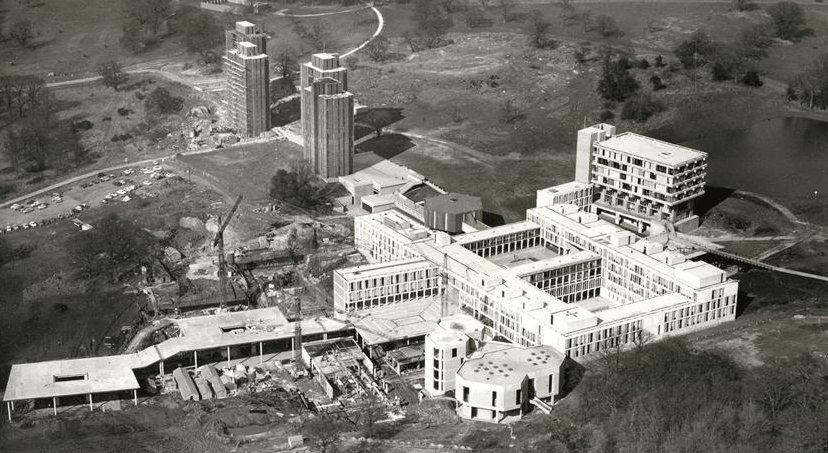As one of the founding departments of the University of Essex, the Department of Sociology is celebrating its 60th anniversary this year. This blog highlights key features of its history and how it plans to mark this special landmark.

- Aerial view of Colchester Campus under construction
Collaborative spirit which continues to inspire
The Department of Sociology was one of the nine founding departments of the University of Essex, which took its first students in October 1964.
The establishment of the University took place at a time of great hope – post-war reconstruction and counter-cultural movements – and followed the decision by the Government to expand higher education by creating a series of new universities.
Since its foundation 60 years ago, the Department of Sociology has become internationally renowned for its innovation, collaboration, and global reach.
On its 40th anniversary, its founding Professor Peter Townsend remarked that “a department which found a place for mathematical modelling, history, anthropology, social philosophy and the sociology of literature”, made “interdisciplinarity inevitable”.
This collaborative spirit continues to inspire us today and is reflected in our vibrant interdisciplinary research community. The Department has played a major role in shaping the discipline of sociology since its inception, fostering and continuing to lead research in gender, sexuality, deviance, sociological criminology, social divisions, social theory, cultural and media studies, survey methods, social stratification and oral history, as well as training generations of sociologists, including many who have become professors of sociology elsewhere, both in the UK and abroad.
More recently, it has supported pioneering research in globalisation, migration, economic sociology, social anthropology, psychosocial studies, human rights and critical data science. Our five centres, the Centre for Research in Economic Sociology and Innovation (CRESI), the Centre for Intimate and Sexual Citizenship (CISC), the Centre for Criminology (C4C), the Centre for Migration Studies (CMS), and the Centre for Global South Studies (CGSS) reflect the breadth of our research interests and are powerhouses of cutting-edge studies, debates, and initiatives.
The Department also played a key role in the creation of two further departments in the University, the Department Psychosocial and Psychoanalytic Studies and the School of Health and Social Care, as well as the Institute for Social and Economic Research.
At our heart is a wonderful team of dedicated staff

- Current and former professional services staff

- Some members of the Department in the early 1980s
At the heart of our community has always been a team of professional service colleagues who have been, and continue to be, absolutely essential to the functioning of the Department and the work of its academics. Today, all of them, whether they have been with us for decades or have recently joined us, continue to provide our students with the kindest and most competent support throughout their studies.

- Graduating students from the Department: Class of 2023

- Sociology students on campus in the early 1980s
New name for flagship department
The celebration of our 60th anniversary has also been an opportunity to reflect on our identity and how our students see us. Interdisciplinary from the start, and offering a range of undergraduate joint degrees and specialist Masters programmes since the early 2000s, interest in the sociological study of crime has grown particularly strongly as evident from the new degrees and masters we have introduced and in student numbers.
To account for this, we have decided to change the name of the Department to the Department of Sociology and Criminology, a new name that acknowledges the historical and contemporary interest in crime, while still encompassing all the areas of study, both established and new, to which we are committed in our research and teaching.

- Covers of books written by Department staff

- Department notice board featuring staff publications, 1960s-1980s
A bookish history: Essex sociology on your shelf
In celebration of the 60th anniversary of the Essex Department of Sociology, this blog offers an excursion into the rich history of Essex sociology through a series of short blogposts on books published by members of our department.
Each blogpost discusses a book published by an Essex sociologist. Books range from seminal publications from the 1960s to hot-off-the-press titles from last year. The posts are written by current members of the department and research students.
Rather than book reviews in the usual sense, they offer a friendly yet honest appraisal of the book’s aims and contributions, the academic and social context it was written in, its impact and legacy, and sometimes the blog author’s personal relationship to the book and its author. Collectively, the posts showcase our diverse and rich research legacy and trace an engaging history of our department.
Blogposts will be published regularly in the coming months. We hope you enjoy this read through the history of Essex sociology.

The Best Circles: Society, Etiquette and The Season
by Leonore Davidoff
Reviewed by Professor Joan Busfield
 The Importance of Disappointment
The Importance of Disappointment
by Ian Craib
Reviewed by Professor Michael Roper
Essex Sociology @ 60 Events
Save the date:
20 September 2024: 60th Anniversary Conference, University of Essex
More events to come – further information will follow very soon!








 The Importance of Disappointment
The Importance of Disappointment

